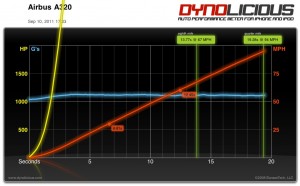Just wrote up a short how-to on how to disable the camera shutter sound in the Google Nexus S 4G – this requires superuser / root but otherwise is a 5 minute procedure.
Nice view up there
Update: Edited the embed because the original video was removed.
httpv://www.youtube.com/watch?v=Ip2ZGND1I9Q
When commercial space tourism becomes attainable (but not necessarily affordable), I’m going to have to see this for myself.
Imperial March
httpv://www.youtube.com/watch?v=yHJOz_y9rZE
I thought it was appropriate.
If you put an airplane on a treadmill…
Estimate the mass of an Airbus A320 at about 170,000lb, start the accelerometer based dyno tool on the iPod touch, and wait for takeoff!
For the record, the estimation based on a 170000lb aircraft was 28596 hp
60′: 4.71 [email protected] MPH
1/8 mi: 13.89 sec@ 66.5 MPH
1/4 mi: 19.40 [email protected] MPH
A rather poor 1/4 mile time that most modern passenger sedans can outrun but keep in mind that while Mom’s Ford will stop accelerating at around 100MPH, this Airbus will continue accelerating until well past 500MPH.
On HP Touchpad’s usefulness
I recently picked up an HP Touchpad at the firesale price of $150 for a 32gig model. This is by far the nerdiest thing I could do with it.
Linux Network Interface Channel Bonding and DHCP
While configuring a few servers I noticed some strange behavior with mode 4 channel bonding (LACP / 802.3ad) and DHCP. You might get the following error message, no matter what you do:
Determining IP information for bond0… failed; no link present. Check cable?
The problem appears to exist in how the interface responds to link status on LACP / 802.3ad ports. The computer is trying to send DHCP packets when the interface itself isn’t ready, causing Linux to think the interface isn’t configured or has no network cable plugged in. This appears to only happen when you use mode 4 channel bonding. Mode 6 works fine. The (band-aid) solution appears to be to trick the system into thinking the interface is already configured. This enables Linux to continue sending DHCP packets until the interface is configured and negotiated successfully with 802.3ad, at which point everything works as planned. Simply insert this at the end of /etc/sysconfig/network-scripts/ifcfg-bond0 – I should note this particular example is for CentOS and RHEL so I haven’t confirmed if this workaround works for Debian based distributions.
check_link_down () { return 1; }
2^128 is a really big number
~ $ dig andrewpeng.net aaaa +short
2607:f298:1:104::a53:ecdd~ $
What the hell is that? It’s my shiny new IPv6 address! Dreamhost makes it stupid easy to assign a IPv6 address to your account; just log into your panel, click on your domain, then just click Add IP Address and that’s it.
I also added an AAAA record for ipv6.andrewpeng.net to make sure to make the distinction for the IPv6 only subdomain, similar to ipv6.google.com and such. If you have IPv6 connectivity, go ahead and give it a try!
Crisis Averted
Really thought I lost the LVM share. There might actually be a bug in the PowerPC Debian kernel that causes it to kernel panic on large LVM partitions. Ever since I switched to an Athlon MP server from my old PowerMac, it hasn’t kernel panicked since. Nice to have a large network drive at home again. Gonna take the plunge and convert the partition to ext4 while I’m at it.
pengc99@zeus:~$ sudo fsck.ext4 -fvy -C 0 /dev/mapper/MASS_STORAGE-STORAGE_LV
e2fsck 1.41.12 (17-May-2010)
Pass 1: Checking inodes, blocks, and sizes
Pass 2: Checking directory structure
Pass 3: Checking directory connectivity
Pass 4: Checking reference counts
Pass 5: Checking group summary information342541 inodes used (0.19%)
1892 non-contiguous files (0.6%)
178 non-contiguous directories (0.1%)
# of inodes with ind/dind/tind blocks: 57159/9867/16
333728343 blocks used (91.11%)
0 bad blocks
57 large files321274 regular files
21258 directories
0 character device files
0 block device files
0 fifos
0 links
0 symbolic links (0 fast symbolic links)
0 sockets
——–
342532 files
pengc99@zeus:~$
A Legacy Concluded
Be nice to your servers
httpv://www.youtube.com/watch?v=tDacjrSCeq4
Yelling at your servers can measurably negatively affect their performance. No joke. Make sure to treat your servers with respect, and keep it quiet in the datacenter!
Perhaps there is a “brown note” for disks (“rust note”?) – some harmonic that destroys their performance; although based on what we think is happening (disk heads being thrown off track), we think this has more to do with shock force than resonance. I’m sure there are disk vendor engineers out there who know all about this (Bryan links to a good reference in his blog entry).
[Source: Sun Microsystems Blog (now Oracle)]


